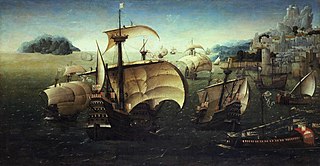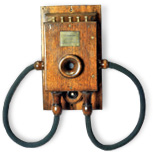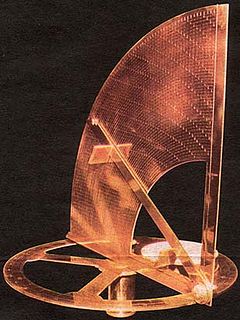 W
WThe Portuguese inventions are the inventions created by the people born in Portugal or whose nationality is Portuguese. These inventions were created mainly during the age of Portuguese Discoveries, but as well, during modernity.
 W
WThe caravel was a small highly-maneuverable sailing ship developed in the 15th century by the Portuguese to explore along the West African coast and into the Atlantic Ocean. The lateen sails gave it speed and the capacity for sailing windward (beating). Caravels were used by the Portuguese and Castilians for the oceanic exploration voyages during the 15th and the 16th centuries, during the Age of Discovery.
 W
WA carrack was a three- or four-masted ocean-going sailing ship that was developed in the 14th to 15th centuries in Europe, most notably in Portugal. Evolved from the single-masted cog, the carrack was first used for European trade from the Mediterranean to the Baltic and quickly found use with the newly found wealth of the trade between Europe and Africa and then the trans-Atlantic trade with the Americas. In their most advanced forms, they were used by the Portuguese for trade between Europe and Asia starting in the late 15th century, before eventually being superseded in the 17th century by the galleon, introduced in the 16th century.
 W
WThe Carracks black sword, sometimes called a crab sword, is a type of sword invented in Portugal, during the 15th century, designed to be used by soldiers and sailors in ships and caravels in the Age of Discovery.
 W
WCerebral angiography is a form of angiography which provides images of blood vessels in and around the brain, thereby allowing detection of abnormalities such as arteriovenous malformations and aneurysms. It was pioneered in 1927 by the Portuguese neurologist Egas Moniz at the University of Lisbon, who also helped develop thorotrast for use in the procedure.
 W
WEslicarbazepine acetate (ESL), sold under the brand names Aptiom and Zebinix among others, is an anticonvulsant medication approved for use in Europe and the United States as monotherapy or as additional therapy for partial-onset seizures epilepsy.
 W
WThe Herrmann wall phone was a type of telephone, created by the Portuguese inventor, Maximiliano Augusto Herrmann, in 1880. The pioneering use of buttons to activate the telephone played a fundamental role to the opening of public lines in the main cities of Portugal. The telephone was composed by a double earpiece, made with long flexible tubes, and a transmitter fixed to main body of the machine.
 W
WNonius is a measuring tool used in navigation and astronomy named in honour of its inventor, Pedro Nunes, a Portuguese author, mathematician and navigator. The nonius was created in 1542 as a system for taking finer measurements on circular instruments such as the astrolabe. The system was eventually adapted into the Vernier scale in 1631 by the French mathematician Pierre Vernier.
 W
WPedro Nunes was a Portuguese mathematician, cosmographer, and professor, from a New Christian family.
 W
WThe Pyreliophorus was a device similar to a burning glass, created by the Portuguese priest Manuel António Gomes, also known as padre Himalaya, whose objective was to melt many different types of materials using solar energy. The device used several reflecting mirrors to concentrate the sunlight into a common point. With this device, it was possible to reach a temperature of around 3500 °C, enough to melt many types of metals and rocks. Unlike a common burning glass, the Pyreliophorus uses a concentric parabolic array of mirrors to concentrate the sun light into a common point, instead of a lens. The device uses a clock system that makes the mirror array concentric axis to rotate along the sun alignment.
 W
WVia Verde is an electronic toll collection system used in Portugal since April 1991. It is available at all toll roads and bridges in the country since 1995. Toll roads and bridges are operated by multiple operators, the main being Brisa - Auto-estradas de Portugal.